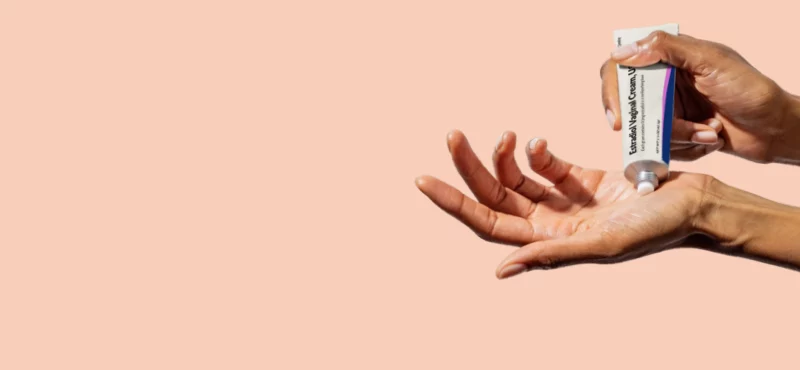Contents
Hyaluronic acid is a non-hormonal ingredient used in vaginal moisturizers to treat vaginal dryness. According to one study, 84% of women reported an improvement in vaginal dryness after 10 uses.
Here, we’ll explain what you need to know about hyaluronic acid, share how it can help reduce vaginal dryness, and go over other tips for reducing vaginal dryness. And if prescription treatment is needed (which it often is) a medical professional like a board-certified doctor at Interlude can help treat vaginal dryness.
What causes vaginal dryness?
55% of postmenopausal women report vaginal dryness, but it can affect women at any age. Vaginal dryness can be extremely distressing and can interfere with your overall health and quality of life in many ways, including:
- Enjoyment of sexual intercourse
- Sense of sexual spontaneity
- Ability to be intimate
- Relationship with your significant other
- Athletic activities
- Everyday activities
The onset of vaginal dryness can begin at different times, with irritation being common in perimenopause and vaginal dryness more likely to begin one year after menopause.
Progression of vaginal dryness
| Stage of menopause | Percent of women reporting vaginal dryness |
|---|---|
| Pre-menopause | 3% |
| Early Perimenopause | 4% |
| Late Perimenopause | 21% |
| Post-menopause 1 year | 25% |
| Post-menopause 2 years | 32% |
| Post-menopause 3 years | 47% |
To relieve this distressing problem, hyaluronic acid can be applied as a vaginal moisturizer to help restore moisture and comfort.
1.) Hyaluronic acid is non-hormonal
Hyaluronic acid is a non-hormonal ingredient. It does not contain hormones, and it does not have any hormone-like effects on the body.
Hyaluronic acid is known as a humectant - meaning it is a substance that retains moisture. When applied internally to the vaginal skin, hyaluronic acid works by hydrating the top layer of the vaginal skin surface.


As a vaginal moisturizer, hyaluronic acid is a compelling solution for several reasons.
- The body naturally produces hyaluronic acid. It helps to keep joints and tissues lubricated and moisturized.
- Hyaluronic acid has been clinically studied as a vaginal moisturizer, and there is emerging evidence to show it is comparable to vaginal estrogen with regard to effectively restoring moisture.
- Side effects from hyaluronic acid are rare. It’s generally safe to use even if you do not want or cannot take other hormonal options such as vaginal estrogen.
2.) Available over-the-counter
Hyaluronic acid is available over-the-counter. But how effective is it compared to other vaginal moisturizers or vaginal lubricants on the market?
In a 2020 review of treatment options for vaginal atrophy, the Menopause Society concluded that there is no evidence to show that vaginal moisturizers that contain hyaluronic acid are more effective than other over-the-counter moisturizers or lubricants.
3.) Does hyaluronic acid work for vaginal dryness?
Yes. Hyaluronic acid is an effective treatment for vaginal dryness. Although hyaluronic acid may not be as effective as prescription therapies, research has found that it can significantly improve symptoms when compared to a placebo.
Emerging research has been conducted on vaginal moisturizers that contain hyaluronic acid and the results are encouraging.
In one small study, researchers concluded that hyaluronic acid and vaginal estradiol are similarly effective at treating vaginal dryness.
In another small study, researchers found that hyaluronic acid and vaginal estrogen both significantly improve symptoms. However, researchers concluded that the improvements were greater with vaginal estrogen.
Group 1: Hyaluronic acid compared to placebo
| Symptom | Improvement after 8 weeks |
|---|---|
| Vaginal dryness | Significant |
| Improvement in vaginal pH | Significant |
Group 2: Vaginal estrogen compared to placebo
| Symptom | Improvement after 8 weeks |
|---|---|
| Vaginal dryness | Significant (more significant than hyaluronic acid) |
| Improvement in vaginal pH | Significant (more significant than hyaluronic acid) |
For women with persistent vaginal dryness after non-hormonal treatments, prescription therapy like vaginal estrogen may provide the greater benefit. Vaginal estrogen works to target the underlying cause of vaginal dryness - which can explain why it may be more effective both in relieving vaginal dryness and in alleviating the myriad of other vaginal and urinary symptoms that arise from loss of estrogen after menopause.
4.) Can be used in combination with other vaginal dryness treatments
A vaginal moisturizer containing hyaluronic acid can be used on its own or in combination with other treatments for vaginal dryness - including vaginal estrogen and vaginal lubricants.
5.) Unlikely to disrupt sensitive vaginal skin or pH
The vaginal environment after menopause can be delicate and sensitive - with dry skin and an increasing risk of vaginal infection. To protect your skin and your vaginal pH, it’s essential to choose a moisturizer that matches the vaginal pH and natural vaginal secretions as much as possible.


Hyaluronic acid is not shown to cause a disruption in the vagina’s skin cells or pH. However, different vaginal moisturizers may contain other ingredients besides hyaluronic acid. For this reason, you’ll want to test a vaginal moisturizer to make sure you don’t have a reaction to the other ingredients.
Next steps
In summary, if you’re looking to alleviate vaginal dryness, hyaluronic acid could be a great place to start. It is the only over-the-counter treatment on the market that’s been studied and proven to have any effect on vaginal dryness.
However, many women may find that over-the-counter treatments are not adequate. In these cases, prescription therapy could be the next option to consider. Vaginal estrogen is available by prescription as a cream, suppository, or ring to reverse vaginal dryness and related symptoms. And, it can be a safer alternative to HRT - even women with a history of breast cancer can take it with approval from their oncologist.
If you’re experiencing vaginal dryness that’s not resolved by over-the-counter treatments, we can help at Interlude. We offer prescription treatment and caring MDs and GYNs to support you on a path to optimal vaginal and urinary health after menopause.



